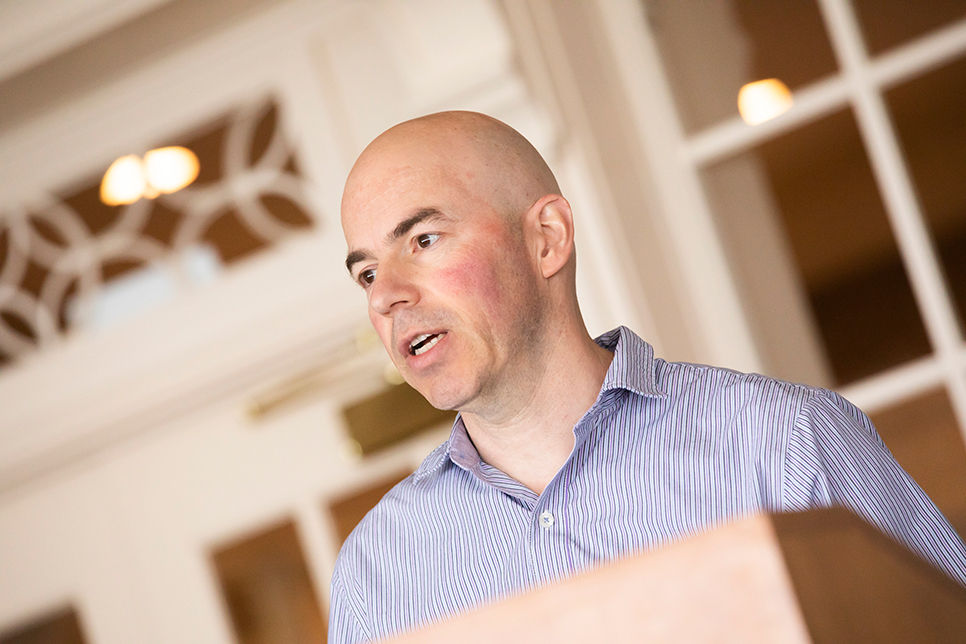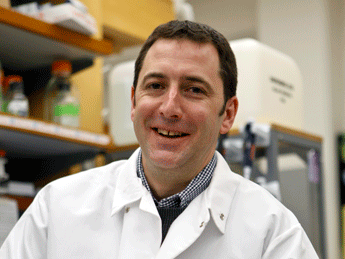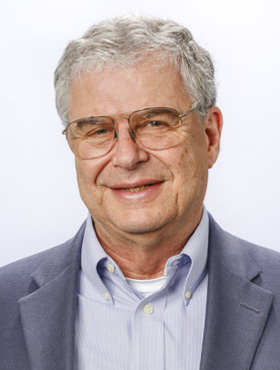
Associate Professor Ron Korstanje, Ph.D. speaking at the Alzheimer's Summit in Point Lookout, Maine, in 2019 (Photo by Thomas Fouchereaux).
Though well known for its work in genetics research, The Jackson Laboratory (JAX) has a long, robust history of training postdoctoral and (more recently) predoctoral students in cutting edge genetic theory and practice.
Continuing in this proud tradition, JAX Ron Korstanje, Ph.D.Studies the genetics of kidney function and disease, particularly in the context of aging, using genetically diverse mouse models.Associate Professor Ron Korstanje, Ph.D. , Gareth Howell, Ph.D.Applies genetics and genomics approaches to study age-related neurodegeneration associated with Alzheimer’s disease, dementia and glaucoma.Associate Professor Gareth R. Howell, Ph.D. , and Professor George Weinstock, Ph.D., have written, and been awarded, a grant that will secure funding for a “Training Program in Precision Genetics of Aging, Alzheimer’s Disease and Related Dementias."

Financial support for the program comes from a $1.1 million awarded by the National Institute on Aging of the National Institutes of Health. Sixteen faculty members in Maine and Connecticut are participating.
With this program, JAX is equipping trainees with the tools they need to become well-rounded individuals who are well-versed in the most modern techniques and free to pursue science at any institution they choose.
“We continually strive to provide cutting-edge, unique, and highly relevant training opportunities designed to prepare all JAX trainees for successful scientific careers,” Korstanje says. He adds that this grant will “provide high-quality graduate and postdoctoral training to prepare (…) trainees for careers as independent investigators in universities, research institutions, and the biomedical industry.”
Any JAX faculty member can put in an application for their postdoc or graduate student to fill one of the four available slots. Once accepted, the individual will receive support for two years, with a different postdoc or graduate student filling the slot for the next two years. In this way, the grant will support the entire JAX community, giving any faculty member a chance to put a postdoc or graduate student of their choice forward as a trainee.
Training precision in genetic research

The trainees will have a rigorous course of study: testing hypotheses regarding the genetic underpinnings of aging and disease, and utilizing the computational science and mouse model resources at JAX to model new diagnostic and therapeutic modalities. The main course of the research is precision genetics: finding ways to personalize treatment and diagnosis in the most accurate way possible.
To accomplish this, trainees will have personalized development opportunities in areas such as teaching and grant writing and will participate in seminars, workshops, and research interest groups. They will also write external funding applications, present their findings at scientific meetings, and publish in peer-reviewed journals.
The ultimate goal is to prepare the students to be leaders in precision genetics of aging and dementia. Or, as Korstanje says, “The program will provide exceptional research opportunities in a stimulating scientific training environment and enable trainees to launch successful independent careers in biomedical research.”